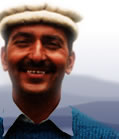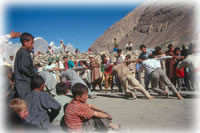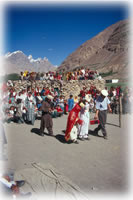 |
 |
||
 |
|||
|
RELATED THEMES culture and customs migration social change spiritual beliefs OTHER LOCAL THEMES BACKGROUND |
festivals
There are a few festivals that are purely Ismaili, the most important being the celebration of Salgirah on 11 July, which marks the day the current Aga Khan took over the role from his grandfather. It is evident, however, that the traditional festivals all have a religious element in the form of special prayers. One man explains: "basically these are not religious festivals these are cultural festivals, but…our grandfathers, our peers you know they transformed it into a very Islamic system and we have very special prayers for them..." (Pakistan 2). One narrator (Pakistan 11) believes that Shimshal's traditional and indigenous festivals have become "corrupted" by the Ismaili institutions, but this is not a sentiment shared by other narrators. Many of the festivals have certain games or entertaining rituals associated with them, and the making and sharing of special foods is also an important part of many festivals. One man describes Hoshigaram: "There is a festival called Hoshigaram… The festival is such that [in the winter] the sun moves beyond the high mountain and half of the village remains in complete shadow, resulting in severe cold. After 40 days of shadow, sunlight fills the entire village; [this day] is called yeer har yupk (sunlight falling on the water). This indicates the decline of winter and brings happiness to the people. As a token of thanks, people prepare soup at their homes and bring it to the Jamat Khana (religious and community centre of Ismaili Muslims) to share" (Pakistan 10). Several testimonies describe the role of the shogunpathok the person designated to inaugurate festivals. This is a hereditary title residing with the family that is considered to be the calmest in temperament. Whilst the detailed descriptions of various festivals by many of the narrators may be of limited interest to outside readers, together they serve as an important historical record for the community itself. quotes about festivals"In former times Vichhosh festival used to be the happiest occasion for us. We would clean the field by removing the snow to prepare the field as a polo ground… All the people would divide into two groups and the seniors would lead the two groups in the polo match. This match would continue for even three days. They would bet on the match and those who lost the match would prepare food and bring it to the Jamat khana (religious and community centre of Ismaili Muslims) and all the male population would participate in that. Normally those who were wealthy were selected as captain of the team so that in the case of losing the match they can sponsor the food." "We have performed the duties as Shogoonpathok (person designated to inaugurate festivals, hereditary position) as far back as six generations… it is not a lucrative nor [is it] a hard job. We only raise our hand and pray to almighty Allah for the betterment of the people. We carry the pathok (offering) and pray for the betterment, safety and prosperity of the people." "…the festivals are so beautifully arranged and very good, this is maybe the main thing which holds us together, we mentally prepare you know what is next. And with every festival there is a game …" "There is a lot of difference between the festivals in former times and today. Personally I was in favour that we should not abandon our customs… lest our culture vanishes and our children remain ignorant of their past… Maula also insists not to give up your culture, in the same way people from outside also come to protect our culture. New organisations are coming into being which insist on the preservation of culture… But…today nobody is available even to irrigate their crop fields, then who will afford time to celebrate these festivals?" "In olden times we would celebrate the customs enthusiastically… But today our interaction with outside people has increased and I feel that this has caused a decline in enjoyment and happiness. In former times we would formally commence the fertiliser delivery to the fields with the celebration of Kethedith… But the happiness has declined. It is probably for the reason that our youth today are busier with development projects of the village." "The system of kooch is such that everyone migrates to the pasture (in summer) where they take combined breakfast. They normally take meals together and they live there in unity. The livestock of those who do not go to Pamir are looked after with great care throughout their stay in Pamir and these livestock are brought back and handed over to their masters. On the day of Kooch festival all the women and men from the village go to the riverbank to welcome them (returning back from pasture). They cross the river and all together come to the village… Amongst these shogoon, Kooch is my favourite festival. It is celebrated with great joy and enthusiasm. People return from Pamir with a lot of earning (livestock product) and plenty of livestock herd." |
|
 Festivals have evidently been a key part of life in Shimshal. The majority of the festivals mark significant events in the agricultural or livestock calendar. Festivals are fondly described in detail by many narrators, and while they are obviously very much alive and valued in people's cultural memory it is difficult to ascertain their status today. Some state how important they are, for example one narrator (Pakistan 17) describes them as
Festivals have evidently been a key part of life in Shimshal. The majority of the festivals mark significant events in the agricultural or livestock calendar. Festivals are fondly described in detail by many narrators, and while they are obviously very much alive and valued in people's cultural memory it is difficult to ascertain their status today. Some state how important they are, for example one narrator (Pakistan 17) describes them as  Other narrators explain that festivals are not celebrated as much today and there is a sense that at least some of the customs and rituals which are associated with festivals are in decline. One narrator (Pakistan 10) claims:
Other narrators explain that festivals are not celebrated as much today and there is a sense that at least some of the customs and rituals which are associated with festivals are in decline. One narrator (Pakistan 10) claims: